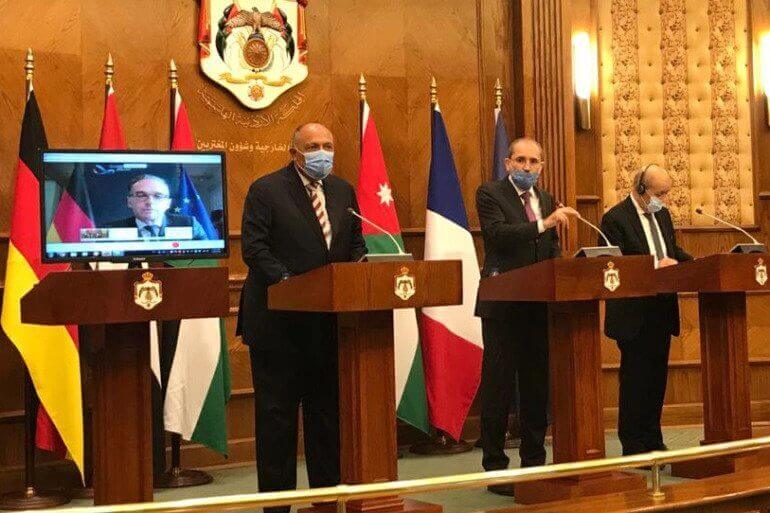On Thursday, the foreign ministers of France, Egypt, Germany, and Jordan convened in Amman to discuss a comprehensive and just advancement of the Middle East Peace Process (MEPP). The meeting was also attended by the European Union’s Special Representative for the MEPP.
In a joint statement, the ministers declared their commitment and support for all peace efforts that are in accordance with United Nations resolutions and the Arab Peace Initiative. They stressed the importance of a two-state solution to the Palestinian issue as per UNSCR 2334 and its provisions, emphasising that Israeli settlements and the confiscation of Palestinian land and properties are a clear violation of international laws. They welcomed the normalization of ties between Israel and the United Arab Emirates (UAE) and Bahrain, noting that the temporary suspension of Tel Aviv’s plans to unilaterally annex West Bank territory as per the clauses of the Abraham Accords must be made permanent.
Further, the top diplomats reiterated the importance of the UN Relief and Works Agency for Palestine Refugees (UNRWA)’s role in providing essential services to refugees and pledged to provide the body with financial and political support. Lastly, the leaders called upon Israel and Palestine to swiftly resume meaningful and serious negotiations as per international law, especially in light of the COVID-19 pandemic that has reminded the international community that cooperation and peace are necessary now more than ever. The European and Arab states promised to maintain their active efforts and involvement in providing a conducive environment for these negotiations, with a progressive view towards achieving regional peace.
“There is no other solution,” French Foreign Minister Jean-Yves Le Drian said, stating that the Israelis and Palestinians must prove their commitment to comprehensive dialogue as the international community is ready to support the process.
In 1979, Egypt became the first Arab country to enter a peace treaty with Israel, followed by Jordan in 1994. Last week, Bahrain and the UAE signed accords brokered by the United States, normalising diplomatic relations with Tel Aviv in a move welcomed by the four European and Arab states who met yesterday.
However, the Palestinians have viewed the agreements as a betrayal to their international pressure campaign on Israel, with the belief that the deals have sabotaged long-standing Arab support for Israeli withdrawal from Palestinian territory and their demand for Palestinian statehood. While the Palestinians have been protesting the deals, rival factions Hamas and Fatah came together on Thursday to announce their unified vision to host general elections in the territory, which will be held in three stages over the next six months.
See also: Angered by Arab-Israel Deals, Palestine Quits Arab League Chair Role

